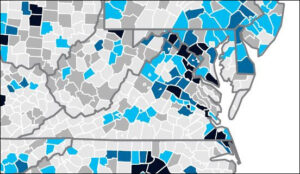
by James A. Bacon
A handful of megacities have captured a majority of U.S. job growth since the Great Recession and could win 60% of job growth through 2030, according to a July McKinsey Global Institute report. A middle tier of “stable” metropolitan areas and thriving niche cities will continue to see job growth, though at a more modest rate than the megacities, while the bottom tier of lagging metros and rural areas will see only marginal growth, if any.
The differential rates of job growth will be driven in part of the next wave of automation, which will displace many office-support, food-service, manufacturing, and customer-service jobs, while a dynamic economy creates more jobs in healthcare, STEM fields, business services, and work requiring personal interaction, says the report, “The Future of Work in America: People and Places, Today and Tomorrow.” “While there could be positive net job growth at the national level, new jobs may not appear in the same places. The challenge will be in addressing local mismatches and help workers gain new skills.”
If McKinsey’s “midpoint” job projections are close to the mark, the Washington metropolitan area will continue to dominate job growth in Virginia, while “stable” metros like Richmond and Hampton Roads will contribute to a lesser degree. The Shenandoah Valley and Roanoke-Lynchburg area will see marginal growth, and the rest of the state negative job growth.
These conclusions put a filigree on what everyone already knows about the challenges facing rural Virginia. What, then, is to be done? McKinsey offers some general strategies for adapting to our brave new world that sound remarkably similar to what I had to say in yesterday’s blog post about rural development. And I quote:
For rural counties, the road is [tough]. Many of these places lack the economic base or the inflows of investment or people to create new jobs. No amount of workforce retraining can solve the bigger challenge of lack of economic activity. Individual companies can help to ease this strain by considering whether there is a business case for establishing operations in more affordable parts of the country that need the investment.
Turning around places that have lost their economic dynamism is a multiyear journey, but it is possible. Each community will have to take inventory of his assets, such as available industrial space, natural attractions, local universities, and specialized workforce skills. That data can form the basis of an economic development plan built around a growth engine industry that can create jobs and spillover effects.
McKinsey is somewhat more optimistic than I am about the ability of rural areas to attract outside capital. I have repeatedly argued that, absent a reversal in the trend to globalization, the cheap land/cheap labor strategy of Virginia mill towns provides diminishing returns because, by global standards, land and labor in rural Virginia are not cheap. But McKinsey says, “The growing acceptance of remote working models could be a positive trend for creating jobs in rural counties, whether full-time work-at-home employee roles of contract work. But it will take a push to continue building out fast, affordable broadband in the regions that still need service.”
Bacon’s bottom line: Economic megatrends in an increasingly knowledge-intensive global economy favor large cities and put small towns and rural areas at a severe competitive disadvantage. Doubling down on the 70-year-old economic development strategy of recruiting light manufacturing jobs will yield limited results. Even if Virginia counties snag industrial investment, continued automation ensures that the number of jobs will be smaller than in the past. Rural Virginia communities must seek to find a more sustainable economic base — in many cases supporting fewer jobs — and learn how to provide essential local government services to a shrinking population.

Leave a Reply
You must be logged in to post a comment.